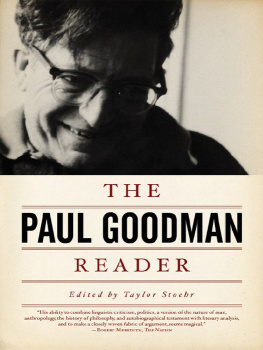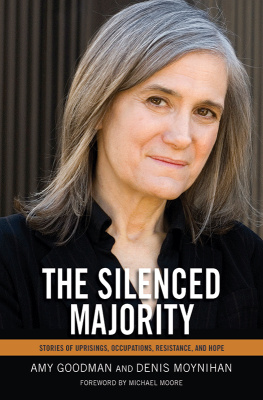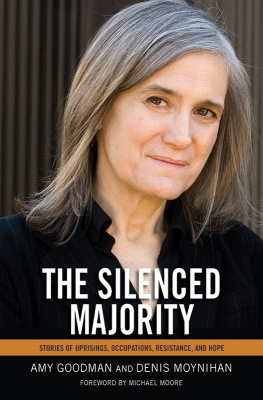GROWING UP ABSURD
PROBLEMS OF YOUTH IN THE ORGANIZED SOCIETY
PAUL GOODMAN
With an essay by
SUSAN SONTAG
NEW YORK REVIEW BOOKS

New York
For
LORE PERLS
Contents
Preface
In every days newspaper there are stories about the two subjects that I have brought together in this book, the disgrace of the Organized System of semimonopolies, government, advertisers, etc., and the disaffection of the growing generation. Both are newsworthily scandalous, and for several years now both kinds of stories have come thicker and faster. It is strange that the obvious connections between them are not played up in the newspapers; nor, in the rush of books on the follies, venality, and stifling conformity of the Organization, has there been a book on Youth Problems in the Organized System.
Those of the disaffected youth who are articulate, howeverfor instance, the Beat or Angry young menare quite clear about the connection: their main topic is the system with which they refuse to co-operate. They will explain that the good jobs are frauds and sells, that it is intolerable to have ones style of life dictated by Personnel, that a man is a fool to work to pay installments on a useless refrigerator for his wife, that the movies, TV, and Book-of-the-Month Club are beneath contempt, but the Luce publications make you sick to the stomach; and they will describe with accuracy the cynicism and one-upping of the typical junior executive. They consider it the part of reason and honor to wash their hands of all of it.
Naturally, grown-up citizens are concerned about the beatniks and delinquents. The school system has been subjected to criticism. And there is a lot of official talk about the need to conserve our human resources lest Russia get ahead of us. The question is why the grownups do not, more soberly, draw the same connections as the youth. Or, since no doubt many people are quite clear about the connection that the structure of society that has become increasingly dominant in our country is disastrous to the growth of excellence and manliness, why dont more people speak up and say so, and initiate a change? The question is an important one and the answer is, I think, a terrible one: that people are so bemused by the way business and politics are carried on at present, with all their intricate relationships, that they have ceased to be able to imagine alternatives. We seem to have lost our genius for inventing changes to satisfy crying needs.
But this stupor is inevitably the baleful influence of the very kind of organizational network that we have: the system pre-empts the available means and capital; it buys up as much of the intelligence as it can and muffles the voices of dissent; and then it irrefutably proclaims that itself is the only possibility of society, for nothing else is thinkable. Let me give a couple of examples of how this works. Suppose (as is the case) that a group of radio and TV broadcasters, competing in the Pickwickian fashion of semimonopolies, control all the stations and channels in an area, amassing the capital and variously bribing Communications Commissioners in order to get them; and the broadcasters tailor their programs to meet the requirements of their advertisers, of the censorship, of their own slick and clique tastes, and of a broad common denominator of the audience, none of whom may be offended: they will then claim not only that the public wants the drivel that they give them, but indeed that nothing else is being created. Of course it is not! not for these media; why should a serious artist bother? Or suppose again (as is not quite the case) that in a group of universities only faculties are chosen that are safe to the businessmen trustees or the politically appointed regents, and these faculties give out all the degrees and licenses and union cards to the new generation of students, and only such universities can get Foundation or government money for research, and research is incestuously staffed by the same sponsors and according to the same policy, and they allow no one but those they choose, to have access to either the classroom or expensive apparatus: it will then be claimed that there is no other learning or professional competence; that an inspired teacher is not solid; that the official projects are the direction of science; that progressive education is a failure; and finally, indeedas in Dr. James Conants report on the high schoolsthat only 15 per cent of the youth are academically talented enough to be taught hard subjects. This pre-empting of the means and the brains by the organization, and the shutting out of those who do not conform, can go so far as to cause delusions, as when recently the president of Merck and Company had the effrontery to warn the Congress that its investigation of profiteering in drugs might hinder the quest of scientific knowledge! as if the spirit of Vesalius and Pasteur depended on the financial arrangements of Merck and Company.
But it is in these circumstances that people put up with a system because there are no alternatives. And when one cannot think of anything to do, soon one ceases to think at all.
To my mind the worst feature of our present organized system of doing things is its indirectness, its blurring of the object. The idea of directly addressing crying objective public needs, like shelter or education, and using our immense and indeed surplus resources to satisfy them, is anathema. For in the great interlocking system of corporations people live not by attending to the job, but by status, role playing, and tenure, and they work to maximize profits, prestige, or votes regardless of utility or even public disutilitye.g., the plethora of cars has now become a public disutility, but automobile companies continue to manufacture them and persuade people to buy them. The indispensable premise of city planning, according to a vice president of Webb and Knapp, is to make a modest long-term profit on the promoters investment. (His exact sentence, to a meeting of young planners, was, What were going to have built will be built only if some developer is going to make a profit from it.!) Obviously he is not directly interested in housing people or in city convenience and beauty; he is directly interested in being a good vice president of Webb and Knapp. That is his privilege, but it is not a useful goal, and an idealistic young fellow would not want to be such a man. Another example: Some earnest liberal Congressmen are baffled how to give Federal aid to education and not interfere in the curriculum and teaching. But when the teaching function is respected and assayed by the teachers peers-in-skill, no one can interfere, no one would dare (just as Harvard tossed out McCarthy). The sole function of administration is to smooth the way, but in this country we have the topsy-turvy situation that a teacher must devote himself to satisfying the administrator and financier rather than to doing his job, and a universally admired teacher is fired for disobeying an administrative order that would hinder teaching. (See Appendix A.) Let me give another example, because I want to make this point very clear: These same Congressmen are concerned how to discourage low-level programming in private TV stations without censorship. Their question presupposes that in communication the prior thing is the existence of networks and channels, rather than something to communicate that needs diffusing. But the prior thing is the program, and the only grounds for the license to the station is its ability to transmit it. Nothing could be more stupid than for the communications commission to give to people who handle the means of broadcasting the inventing of what to broadcast, and then, disturbed at the poor quality, to worry about censorship.
Next page










